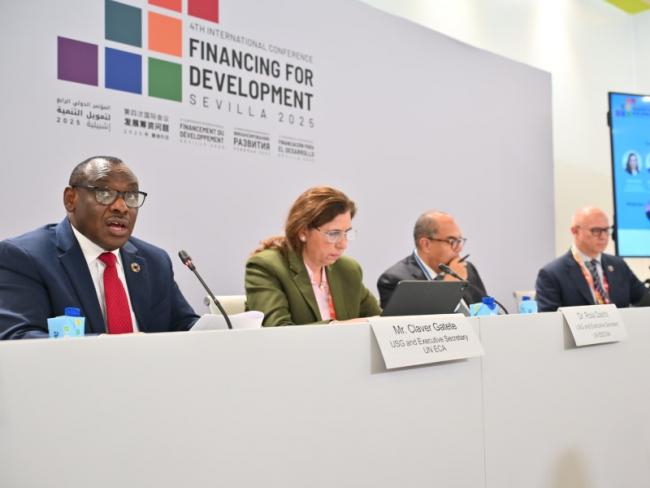Africa Must Scale Innovative Financing Instruments to Bridge 1.3 Trillion USD SDG Financing Gap, Says ECA's Chief - ENA English
Africa Must Scale Innovative Financing Instruments to Bridge 1.3 Trillion USD SDG Financing Gap, Says ECA's Chief

Addis Ababa, July 1, 2025 (ENA) - Africa must scale innovative financing instruments as it faces a significant shortfall of 1.3 trillion USD per year in its Sustainable Development Goals (SDG) financing gap – resources that could enable a just transition, expand healthcare, and transform education.
This urgent call was made by United Nations Under-Secretary-General and Executive Secretary of the Economic Commission for Africa (ECA), Claver Gatete, during the FfD4 High-Level Side Event on Mobilizing Finance for Sustainable Development held in Seville, Spain, on June 30, 2025.
Speaking at the timely dialogue reflecting on collective progress and envisioning a renewed future for development finance, Gatete underscored the critical stakes involved.
"As we speak, climate shocks are intensifying, debt levels are rising, the geopolitical terrain is volatile, and development financing is tightening at the very moment we need it most," he stated.
He highlighted that the global SDGs financing gap currently stands at 4 trillion annually, with Africa alone accounting for a 1.3 trillion USD per year shortfall.
Despite the continent's "vast potential" in renewable energy, arable land, and human capital, access to affordable, long-term finance remains elusive. Gatete attributed this challenge to "long-standing structural challenges and a fragmented financing architecture."
The ECA, he noted, is actively advancing practical solutions to bridge this divide, outlining several priority actions. Among these, Gatete emphasized the critical need to scale innovative financing instruments.
He provided an example from the Democratic Republic of Congo, where "ECA is piloting a debt-for-nature-and-industrialization swap – linking debt relief to investment in battery and EV value chains."
The Executive Secretary further elaborated that "These approaches offer a pathway to both fiscal sustainability and green industrialization."
Another key action is supporting the Sustainable Debt Coalition, for which ECA serves as Secretariat. This coalition brings countries and partners together "to enhance access to climate finance, reduce borrowing costs and strengthen fiscal resilience." In this regard, Gatete called for "broader participation and deeper global support."
Strengthening country platforms and policy coherence is also crucial for building investor confidence, according to Gatete.
He pointed to the ECA's African Investment Map, which is designed to de-risk capital flows and direct investment toward bankable, high-impact projects.
Furthermore, the ECA is focused on unlocking blended finance at scale. This involves working with DFIs, philanthropic partners and platforms like Convergence to mobilize commercial capital while mitigating risk. Gatete also stressed the importance of building a "pipeline of investable projects."
Finally, Gatete highlighted the necessity of deepening domestic financial markets and improving sovereign credit ratings.
He asserted, "We believe it is imperative that Africa builds resilience from within, even as we seek global solidarity."
In conclusion, Gatete reiterated that "sustainable development cannot wait" and that "the solutions exist."
He emphasized that what is truly needed is "the political will, the coordination and the partnership to deliver at scale." He affirmed the ECA's readiness to work with you to turn these priorities into impact for our people and our planet.